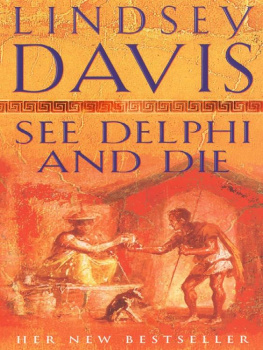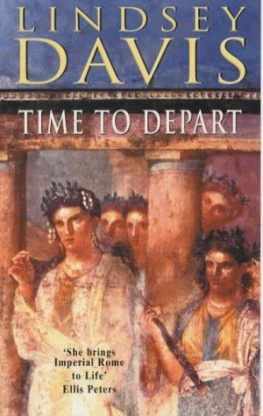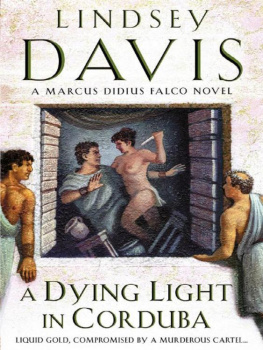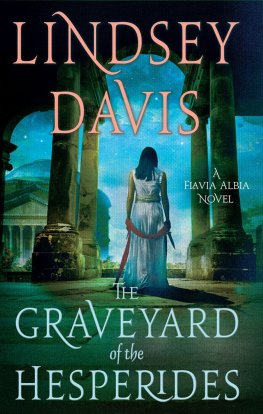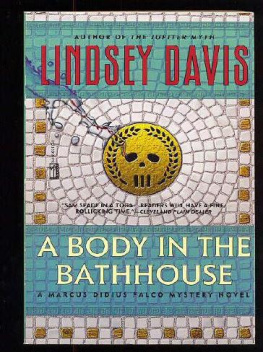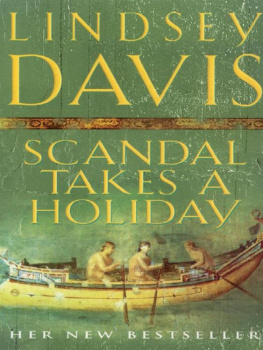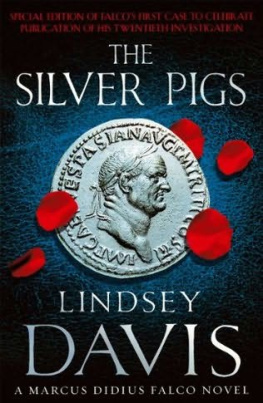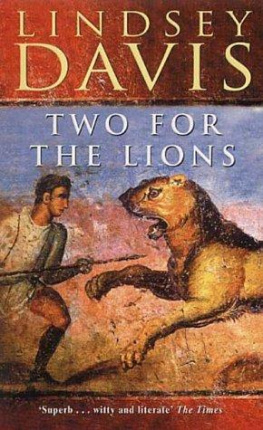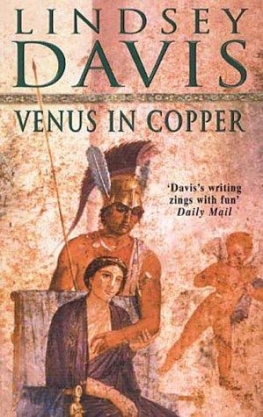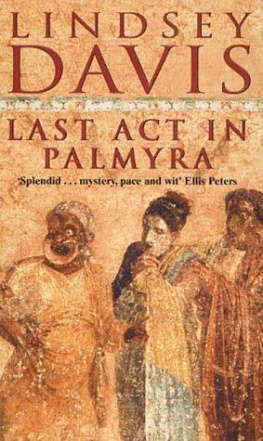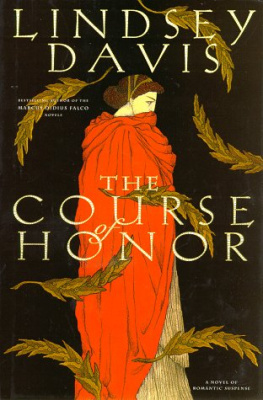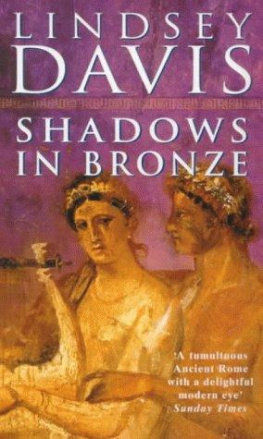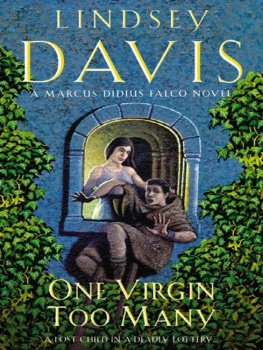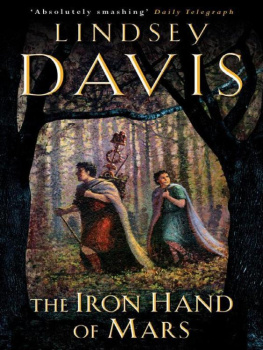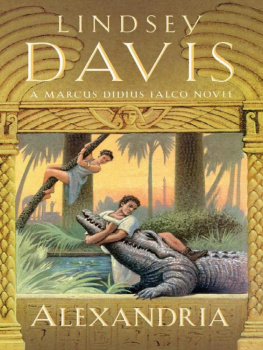Lindsey Davis - See Delphi and Die: A Marcus Didius Falco Mystery
Here you can read online Lindsey Davis - See Delphi and Die: A Marcus Didius Falco Mystery full text of the book (entire story) in english for free. Download pdf and epub, get meaning, cover and reviews about this ebook. year: 2007, publisher: St. Martins Press, genre: Detective and thriller. Description of the work, (preface) as well as reviews are available. Best literature library LitArk.com created for fans of good reading and offers a wide selection of genres:
Romance novel
Science fiction
Adventure
Detective
Science
History
Home and family
Prose
Art
Politics
Computer
Non-fiction
Religion
Business
Children
Humor
Choose a favorite category and find really read worthwhile books. Enjoy immersion in the world of imagination, feel the emotions of the characters or learn something new for yourself, make an fascinating discovery.
- Book:See Delphi and Die: A Marcus Didius Falco Mystery
- Author:
- Publisher:St. Martins Press
- Genre:
- Year:2007
- Rating:4 / 5
- Favourites:Add to favourites
- Your mark:
- 80
- 1
- 2
- 3
- 4
- 5
See Delphi and Die: A Marcus Didius Falco Mystery: summary, description and annotation
We offer to read an annotation, description, summary or preface (depends on what the author of the book "See Delphi and Die: A Marcus Didius Falco Mystery" wrote himself). If you haven't found the necessary information about the book — write in the comments, we will try to find it.
See Delphi and Die: A Marcus Didius Falco Mystery — read online for free the complete book (whole text) full work
Below is the text of the book, divided by pages. System saving the place of the last page read, allows you to conveniently read the book "See Delphi and Die: A Marcus Didius Falco Mystery" online for free, without having to search again every time where you left off. Put a bookmark, and you can go to the page where you finished reading at any time.
Font size:
Interval:
Bookmark:
Lindsey Davis
SEE DELPHI AND DIE
A Novel of Marcus Didius Falco
PART ONE
ROME
I
'Marcus, you must help me!'
I am a private informer, a simple man. I was stunned by this dramatic plea. My silk-clad, scented mother-in-law rarely needed anything from me. Suddenly the noble Julia Justa sounded like one of my clients.
All I wanted that evening was a better dinner than I could expect at home, where - not for the first time - I had made a bad mistake in buying a cook. Julia Justa had already enjoyed herself that night reviewing my dismal record in acquiring household slaves. In return for the dinner I would also have to put up with barbed comments about the failings of Helena and me as parents. Helena would retaliate, while her father and I grinned behind our hands until both women rounded on us, after which the slaves would carry in dessert and we would all fall on the quinces and figs...
Family life. I knew where I stood with that. It was better than the old days, when I worked alone from a two-room doss where even the gecko had sneered at me. There, the women who had sought me out were two ranks and many degrees of politeness below my mother-in-law. Their pleas were dismal and they needed help for filthy reasons. What they offered in return went far beyond the grudging thanks I would expect here, though it rarely involved money.
'I am, of course, at your disposal, dear Julia.'
The senator grinned. 'Not too busy at the moment?'
'Surprisingly quiet,' I told him. 'I'm waiting for the normal rash of divorces when couples come back to Rome after the holidays.'
'Cynic, Marcus! What is the matter, mother?' Helena sized up a platter of fruit; she was looking for a piece to give to our elder daughter. Favonia, our youngest, was happy to spend half an hour sucking a single grape but little Julia, left to herself, would take a bite out of every peach and pear, then surreptitiously put each one back on the dish.
'Everything is the matter!' Julia Justa posed in a refined manner, yet several rows of pendant gold beads quivered among the fragrant folds of sage green silk on her bosom. Beside her on the couch, the senator moved away slightly, afraid that she might bruise him with an angry elbow.
Helena now shot her father a brief glance as if she thought he was trouble-making. I enjoyed watching the interplay. Like most families, the Camilli had established myths about themselves: that the senator was constantly harassed and that his wife was allowed no influence at home, for example. The legend that their three children were a constant trial held most truth, although both Helena and her younger brother Justinus had settled down, with partners and offspring. Not that I made a reassuring husband.
It was the elder son, Julia Justa's favourite, who had caused her current anguish. 'I am devastated, Marcus! I thought Aulus was doing something sensible at last.'
At twenty-seven, Aulus Camillus Aelianus was still a happy bachelor who had lost interest in entering the Senate. He was feckless and rootless. He spent too much; he drank; he stayed out late; he probably womanised, though he had managed to keep that quiet. Worst of all, he sometimes worked for me. Being an informer was a rough trade for a senator's son; well Hades, it was rough for me, and I was slum-born. The Camilli were struggling socially; a scandal would finish them.
'He agreed to go to Athens!' his mother raved, while the rest of us listened. To everyone's surprise, attending university had been his own choice - the only hope of it working. 'It was a solution. We sent him so he could study, to develop his mind, to mature.
'You cannot have heard from him already?' It was only a few weeks since we waved off Aulus on a ship for Greece. That was in August. His mother had fretted that it would be months before he bothered to write home; his father had joked that that would be as soon as the letters of credit ran out, when Aulus scribbled the traditional plea: 'Safely arrived - Send more cash immediately!' The senator had warned him that there was no more cash; still, Aulus knew he was his mother's pet. He would write to Julia and she would work on Decimus.
Now we learned that Aulus had let himself be sidetracked and, oddly for an intelligent fellow, he had owned up to his mama. 'Marcus, the damn ship stopped at Olympia. Of course I don't mind Aulus visiting the sanctuary of Zeus, but he's up to something else entirely -'
'So what is the big draw? Apart from sun, sport, and avoiding serious study?'
'Don't tease me, Marcus.'
I tried to remember whether they had held Olympic Games this year. Nero famously altered the centuries-old timing, so the mad emperor could compete in events during his tour of Greece. Unforgettable and embarrassing; a catalogue of pretending to be a herald, giving dreary recitals, and expecting to win everything, whether he was any good or not.
I fancied the date had now been altered back. By my rapid calculation the next Games would be next August. 'Relax, Julia. Aulus can't be wasting time as a spectator.'
Julia Justa shuddered. 'No, it's worse. Apparently he met a group of people and one of them had been horribly killed.'
'Oh?' I managed to keep my voice neutral, though Helena looked up from mopping juice from Favoma's white tunic.
'Well, Marcus,' Julia Justa said darkly, as if this was clearly my fault. 'It is just the kind of situation you taught him to get excited about.' I tried to look innocent. 'Aulus is suspicious because it is very well known that another young girl from Rome vanished at the last Olympic Games. And she was eventually found murdered too.'
'Aulus is trying to help these people?'
'It's not for him to involve himself-' I saw it all now. My task was to take over and steer young Aulus back on his way to university. The noble Julia was so eager to have him with his nose in a law scroll, she was ready to sell her jewellery. 'I will pay your fare to Greece, Marcus. But you must agree to go and sort this out!'
II
Taking orders from a subordinate is bad enough. Following up some lousy lead he has only bothered to pass on via his mother must be the billygoat's armpit. Even so, I did ask to read the letter.
Later, safely back at home, Helena Justina poked me in the ribs. 'Own up. You are fascinated.'
'Mildly curious.'
'Why did my ridiculous brother alert Mama?'
'Too lazy to write separately to us. He wants to know what the father has to say - the father of the first dead girl.'
'Had you heard about that?'
'Vaguely. It's the Caesius case.'
'So you are going to see the father? Can I come too?'
'No.'
Helena came with me.
We knew in advance the interview would be sensitive.
This was the situation - at the Olympic Games three years ago a young girl, travelling with a group of sightseers from Rome, went missing. Her distraught father tried to investigate; in fact, he had been doing so non-stop - far too long to nag on about it, the hard-hearted Roman public thought. He went out there and doggedly searched until he found the girl's remains. He tried to discover the circumstances of her death, then was soon making well-publicised claims that his child had been murdered. He had been agitating for answers ever since.
Finding the girl's body annoyed the authorities; they had failed to investigate properly in the first place, so they resisted reopening the enquiry. Knowing the daughter was dead took Caesius no further. Eventually he ran out of time, money, and energy; he was forced to return home, case unproven. Still obsessed, he had managed to rake up some interest among the Forum gossips, which was why I had heard of him. Most people dismissed him as a man crazed by grief, an embarrassment. I had felt some sympathy. I knew how I would react if one of my girls ever went missing.
Next pageFont size:
Interval:
Bookmark:
Similar books «See Delphi and Die: A Marcus Didius Falco Mystery»
Look at similar books to See Delphi and Die: A Marcus Didius Falco Mystery. We have selected literature similar in name and meaning in the hope of providing readers with more options to find new, interesting, not yet read works.
Discussion, reviews of the book See Delphi and Die: A Marcus Didius Falco Mystery and just readers' own opinions. Leave your comments, write what you think about the work, its meaning or the main characters. Specify what exactly you liked and what you didn't like, and why you think so.

